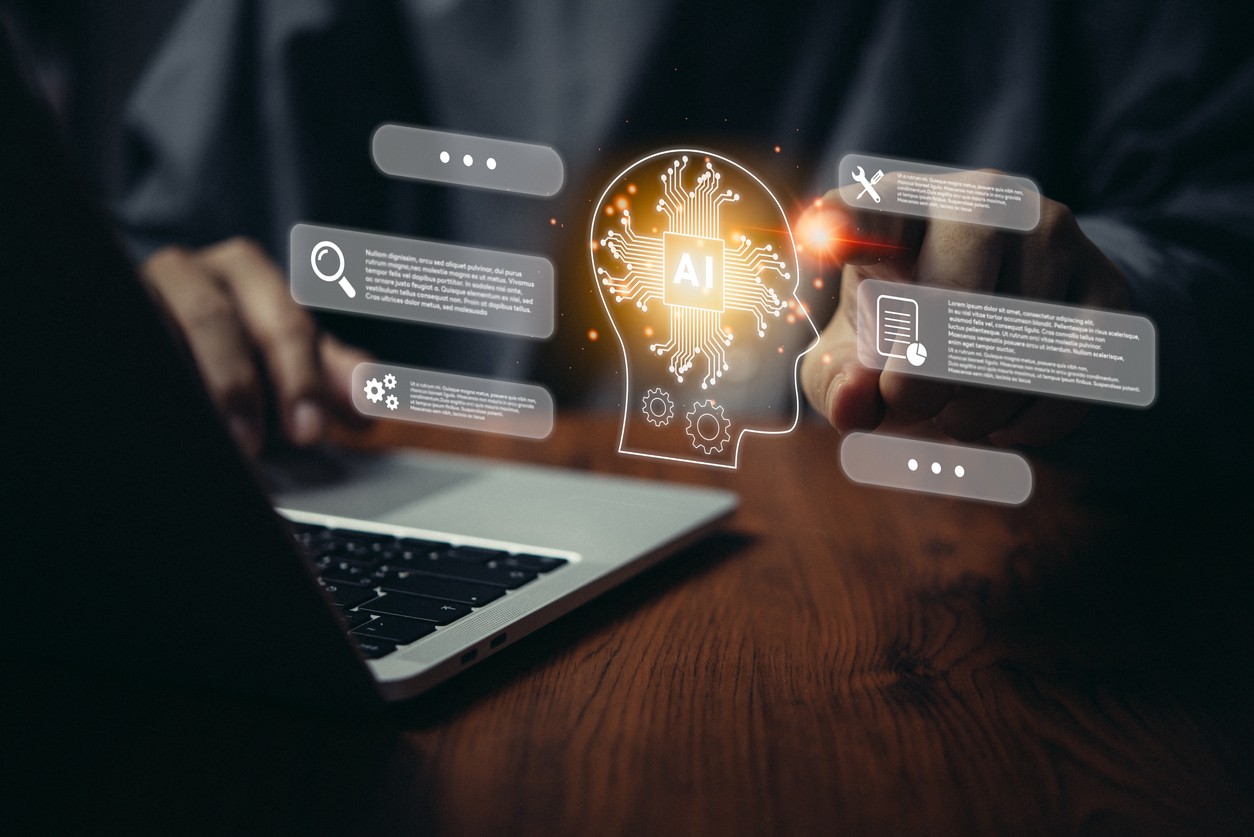In today’s rapidly evolving digital landscape, the role of artificial intelligence (AI) in shaping the future of marketing has become undeniable. AI has transcended the realm of science fiction and emerged as a powerful tool that goes beyond human capabilities, revolutionizing the way businesses engage with their customers. From personalized user experiences to advanced data analysis and automated campaign management, AI has the potential to reshape the entire digital marketing landscape.
By harnessing the immense power of AI, businesses can unlock new levels of efficiency, precision, and effectiveness in their marketing strategies. AI algorithms can analyze vast amounts of data with lightning speed, unveiling valuable insights and trends that can drive data-driven decision-making and optimization. Moreover, AI enables businesses to create personalized experiences for customers, tailoring content, recommendations, and advertising to meet individual needs and preferences.
The future of AI in digital marketing holds even greater promises. As technology advances, we can expect AI to play an increasingly integral role in our marketing efforts. Imagine campaigns that practically manage themselves, chatbots that provide instant support, and virtual assistants that understand and anticipate customer needs. The possibilities are endless.
However, implementing AI in your digital marketing strategy requires careful planning, consideration, and understanding. It involves identifying the right areas for AI implementation, choosing the appropriate tools and platforms, collecting and integrating relevant data, training and optimizing AI models, and continuously monitoring and evaluating their performance.
While the potential benefits of AI in digital marketing are immense, there are also challenges to overcome. Ethical considerations, data privacy concerns, algorithm bias, and the need for skilled professionals are among the hurdles that businesses must navigate. By understanding both the benefits and challenges, organizations can harness the power of AI while mitigating risks.
In this comprehensive guide, we will delve deep into the future of AI in digital marketing and explore how it can impact your business. We will examine the current state of AI in digital marketing, discuss the transformative possibilities that lie ahead, and provide practical insights on implementing AI in your marketing strategy. So, get ready to embrace the limitless potential of AI and discover how it can elevate your business to new heights in the digital realm.
Understanding AI in Digital Marketing:
AI, or artificial intelligence, is a revolutionary technology that has made its way into the world of digital marketing, transforming the way businesses interact with their audiences. At its core, AI refers to the development of intelligent machines capable of performing tasks that typically require human intelligence.
In the context of digital marketing, AI brings about a multitude of benefits by leveraging its ability to analyze vast amounts of data, automate processes, and deliver personalized experiences. Let’s take a closer look at each of these aspects:
-
Data Analysis
- AI possesses the remarkable capacity to analyze enormous volumes of data quickly and efficiently. By processing and interpreting this data, AI algorithms can uncover valuable insights, trends, and patterns that humans may not easily detect. This data analysis enables businesses to make data-driven decisions and optimize their marketing strategies based on accurate and relevant information.
-
Process Automation
- AI excels in automating repetitive tasks and streamlining processes. Mundane activities like data entry, content scheduling, and social media posting can be automated, freeing up valuable time and resources for marketers. Automation reduces human error, ensures consistency, and allows marketers to focus on strategic initiatives that require creativity and critical thinking.
-
Personalized Experiences
- One of the most significant advantages of AI in digital marketing is its ability to deliver personalized experiences to customers. AI algorithms can analyze user behavior, preferences, and purchase history to create tailored content, product recommendations, and targeted advertisements. This level of personalization enhances customer engagement, fosters brand loyalty, and increases the chances of conversions.
AI in digital marketing goes beyond simple automation or data analysis. It empowers businesses to provide a more engaging and customized experience to their audience, ultimately leading to better marketing outcomes. By leveraging the power of AI, marketers can gain a competitive edge in today’s dynamic digital landscape.
As we delve deeper into the realm of AI in digital marketing, we will explore its current applications, future possibilities, and practical implementation strategies. So, let’s embark on this journey to uncover the immense potential of AI in driving your digital marketing success.
The Current State of AI in Digital Marketing:
AI has already made significant strides in the field of digital marketing, revolutionizing various aspects of customer engagement and campaign management. Let’s explore some of the current applications of AI that are transforming the landscape of digital marketing:
-
Recommendation Systems:
- AI-powered recommendation systems have become a staple in digital marketing. These systems analyze user data, including browsing history, purchase behavior, and preferences, to offer personalized product recommendations. Examples include Amazon’s “Customers who bought this also bought” and Netflix’s personalized movie suggestions. By leveraging AI, businesses can enhance customer experiences, drive conversions, and foster brand loyalty.
-
Predictive Analytics:
- AI algorithms can crunch vast amounts of data to predict future outcomes and trends. In digital marketing, predictive analytics helps businesses optimize their strategies by forecasting customer behavior, identifying high-value leads, and predicting campaign performance. By leveraging predictive analytics, marketers can make data-driven decisions and allocate resources more effectively, resulting in improved ROI.
-
Chatbots:
- AI-powered chatbots have become increasingly prevalent across websites and messaging platforms. These virtual assistants engage in automated conversations with customers, providing instant support, answering queries, and guiding users through the sales funnel. Chatbots improve customer satisfaction, reduce response times, and enable businesses to provide round-the-clock support. Examples include the chatbots used by companies like Sephora and H&M.
-
Content Generation:
- AI technologies, such as natural language processing and machine learning, are being employed to generate content. AI can generate personalized email campaigns, product descriptions, blog posts, and even social media content. While human input is still crucial for creativity and strategic direction, AI-driven content generation streamlines the process, saves time, and ensures consistency.
-
Ad Targeting and Optimization:
- AI algorithms analyze user data and behavior to deliver highly targeted advertisements. By understanding user preferences, demographics, and online activities, AI can optimize ad targeting, placement, and bidding strategies. This level of precision maximizes ad performance, increases click-through rates, and reduces wasted ad spend.
These are just a few examples of how AI is transforming digital marketing practices today. As technology advances, we can expect AI to continue evolving and expanding its impact on various marketing disciplines.
In the next sections, we will delve into the future of AI in digital marketing, exploring the possibilities of personalized user experiences, advanced data analysis, automated campaign management, and the growing role of AI-powered chatbots. Let’s uncover how these advancements can benefit your business and drive your digital marketing strategies to new heights.
The Future of AI in Digital Marketing:
-
Personalized User Experiences:
- AI holds immense potential in enabling businesses to deliver highly personalized user experiences. Through AI-powered algorithms, businesses can analyze vast amounts of user data, including browsing history, purchase behavior, and demographic information. This analysis allows marketers to create tailored experiences by delivering personalized content, product recommendations, and targeted advertising.
- By understanding individual preferences and needs, AI can optimize the customer journey, increasing engagement and conversion rates. For instance, e-commerce platforms can use AI to recommend products based on users’ browsing and purchase history, creating a seamless and personalized shopping experience. Personalization fosters stronger connections with customers, enhances brand loyalty, and ultimately drives business growth.
-
Advanced Data Analysis and Insights:
- AI’s ability to analyze data goes far beyond what traditional methods can achieve. AI-powered algorithms can sift through vast datasets in real time, uncovering valuable insights, trends, and patterns. This advanced data analysis enables businesses to make data-driven decisions, optimize marketing campaigns, and identify new opportunities for growth.
- By leveraging AI, marketers can gain a deeper understanding of their target audience, predict customer behavior, and identify emerging market trends. This knowledge empowers businesses to fine-tune their strategies, optimize content, and deliver more relevant and impactful marketing campaigns. AI’s data analysis capabilities provide a competitive advantage by ensuring marketers are equipped with accurate and actionable insights.
-
Automated Campaign Management:
- The future of AI in digital marketing also lies in automated campaign management. AI can automate various aspects of marketing campaigns, saving time and resources while improving efficiency and effectiveness. From ad targeting and bidding to content creation and scheduling, AI streamlines processes, allowing marketers to focus on strategy and creativity.
- AI-powered tools and platforms can analyze campaign data, optimize ad placements, and automatically adjust targeting parameters in real time. This automation ensures that marketing campaigns are consistently optimized for maximum performance. By reducing manual effort and providing real-time insights, AI helps marketers make data-backed decisions and achieve better campaign outcomes.
-
Chatbots and Virtual Assistants:
- AI-powered chatbots and virtual assistants are set to play a crucial role in enhancing customer support and user experience. Chatbots use natural language processing and machine learning to engage in automated conversations with customers, providing instant assistance, answering queries, and guiding users through the sales funnel.
- As AI advances, chatbots are becoming more sophisticated, with the ability to understand context, personalize responses, and simulate human-like interactions. Virtual assistants powered by AI can handle complex tasks, provide personalized recommendations, and deliver a seamless and efficient user experience across multiple touch points.
- By incorporating chatbots and virtual assistants, businesses can provide round-the-clock support, reduce response times, and enhance customer satisfaction. These AI-powered solutions streamline customer interactions, improve engagement, and free up human resources to focus on more complex or specialized tasks.
As we move forward, the future of AI in digital marketing holds immense potential for personalized user experiences, advanced data analysis, automated campaign management, and AI-powered chatbots and virtual assistants. By embracing these advancements, businesses can gain a competitive edge, drive growth, and meet the evolving demands of the digital landscape.
Implementing AI in Your Digital Marketing Strategy:
-
Identify Areas for AI Implementation:
- To successfully implement AI in your digital marketing strategy, it’s crucial to identify the areas where AI can provide the most significant impact. Start by evaluating your current marketing processes and identifying tasks that are time-consuming, repetitive, or require extensive data analysis. Areas such as customer segmentation, content personalization, lead scoring, and campaign optimization are prime candidates for AI implementation. By focusing on these areas, you can maximize the benefits of AI and streamline your marketing efforts.
-
Choose the Right AI Tools and Platforms:
- Selecting the appropriate AI tools and platforms is a critical step in implementing AI effectively. Consider your business goals, budget, and technical requirements when choosing AI solutions. Evaluate the available options for AI-powered marketing automation, predictive analytics, personalization engines, and chatbot platforms. Look for tools that align with your specific needs and integrate seamlessly with your existing marketing technology stack. It’s essential to choose reliable and reputable providers that offer robust support and scalability to accommodate future growth.
-
Data Collection and Integration:
- For AI to deliver optimal results, collecting and integrating relevant data is crucial. Start by identifying the data sources that are most valuable for your marketing initiatives, such as customer interactions, website analytics, CRM systems, and social media platforms. Implement robust data collection mechanisms and ensure compliance with data privacy regulations. It’s important to clean and organize the data to eliminate inconsistencies and ensure accuracy. Integrating this data into a unified platform will enable AI algorithms to access and analyze the information effectively.
-
Training and Optimization:
- Training AI algorithms is a continuous process that involves feeding them relevant data and refining their performance over time. Start by providing historical data and defined outcomes to train the algorithms. As the algorithms learn from the data, they can optimize marketing campaigns, personalize experiences, and predict customer behavior. It’s essential to monitor the AI models’ performance, analyze the results, and make necessary adjustments. Continuous learning and optimization will help the AI algorithms improve accuracy, adapt to changing market dynamics, and deliver better marketing outcomes.
-
Monitoring and Evaluation:
- Ongoing monitoring and evaluation are crucial to ensure the effectiveness of AI-driven campaigns and strategies. Establish key performance metrics aligned with your marketing objectives, such as conversion rates, customer engagement, or ROI. Implement A/B testing to compare the performance of AI-driven initiatives against traditional methods. Human oversight and interpretation of AI-generated insights are essential to understand the context and make informed decisions. Regularly assess the performance of AI algorithms, identify areas for improvement, and iterate on your strategies to achieve optimal results.
By implementing AI in your digital marketing strategy through careful identification, selection, and integration, you can leverage its power to automate tasks, optimize campaigns, and deliver personalized experiences. Continuous monitoring, evaluation, and refinement will ensure that your AI-driven initiatives remain aligned with your marketing goals and drive meaningful results. Stay agile and adaptable as the field of AI evolves, embracing new opportunities to stay ahead of the curve and achieve sustainable growth.
Benefits and Challenges of AI in Digital Marketing:
Benefits:
Incorporating AI into digital marketing brings a wide range of benefits that can significantly enhance marketing strategies and drive business success. Some key benefits of AI in digital marketing include:
-
Enhanced Personalization:
- AI enables businesses to deliver highly personalized experiences by analyzing customer data and tailoring content, recommendations, and advertisements based on individual preferences. Personalization increases customer engagement, improves conversion rates, and fosters brand loyalty.
-
Improved Efficiency and Productivity:
- AI automates time-consuming tasks, such as data analysis, content creation, and campaign management, freeing up marketers to focus on strategic initiatives. Automation reduces human error, increases efficiency, and enables marketers to allocate their time and resources more effectively.
-
Data-Driven Decision-Making:
- AI algorithms analyze vast amounts of data, uncovering valuable insights, trends, and patterns that humans may not easily detect. By leveraging these insights, businesses can make data-driven decisions, optimize campaigns, and allocate resources more effectively, resulting in improved ROI.
-
Enhanced Customer Support:
- AI-powered chatbots and virtual assistants provide instant and round-the-clock customer support. They can answer customer queries, provide product recommendations, and guide users through the sales funnel. This improves customer satisfaction, reduces response times, and enhances the overall customer experience.
-
Predictive Analytics:
- AI algorithms can forecast customer behavior, identify high-value leads, and predict campaign performance. Predictive analytics helps businesses optimize their marketing strategies, anticipate customer needs, and make proactive decisions to stay ahead of the competition.
 Challenges:
Challenges:
While the benefits of AI in digital marketing are significant, there are also challenges that businesses must address when implementing AI strategies. Some of the key challenges include:
-
Data Privacy and Security:
- With AI relying heavily on customer data, ensuring data privacy and security is crucial. Businesses must comply with relevant regulations and implement robust security measures to protect customer information and build trust.
-
Ethical Considerations:
- AI algorithms may inadvertently perpetuate biases or discriminatory practices if not properly designed or monitored. Businesses need to be mindful of ethical considerations and ensure that their AI models are fair, transparent, and unbiased.
-
Skill Requirements and Training:
- Implementing AI effectively requires a team with the right skills and expertise. Businesses may face challenges in finding professionals who can understand and implement AI technologies. Ongoing training and up skilling are necessary to keep up with the evolving AI landscape.
-
Integration with Existing Systems:
- Integrating AI tools and platforms with existing marketing systems can be complex. Compatibility issues, data integration challenges, and technical constraints may arise, requiring careful planning and execution to ensure seamless integration.
-
Overreliance on AI:
- While AI offers powerful capabilities, it’s important to strike a balance and not rely solely on AI-driven solutions. Human creativity, intuition, and critical thinking still play a crucial role in developing effective marketing strategies.
By understanding and addressing these challenges, businesses can navigate the implementation of AI in digital marketing successfully, maximizing the benefits while mitigating the risks. With careful planning, monitoring, and adaptation, AI can revolutionize digital marketing practices and drive business growth in the digital era.
What Industries Will AI Change?
AI has the potential to transform numerous industries, revolutionizing the way businesses operate and the services they provide. Let’s explore some key industries where AI is poised to make a significant impact:
-
AI in Transportation:
- The transportation industry stands to benefit greatly from AI advancements. AI-powered technologies can optimize route planning, predict traffic patterns, and enhance transportation efficiency. Autonomous vehicles and drones, enabled by AI, have the potential to revolutionize transportation systems, improving safety, reducing congestion, and optimizing logistics.
-
AI in Manufacturing:
- AI is reshaping the manufacturing industry by introducing automation, predictive maintenance, and quality control. AI-powered robots and machines can streamline production processes, monitor equipment performance, and detect anomalies. This improves productivity, reduces downtime, and enhances product quality.
-
AI in Healthcare:
- AI is transforming the healthcare industry by revolutionizing diagnostics, drug discovery, and patient care. AI algorithms can analyze medical data, assist in diagnosis, and predict patient outcomes. AI-powered systems can also automate administrative tasks, enhance telemedicine services, and improve the overall healthcare experience.
-
AI in Education:
- AI has the potential to enhance education by personalizing learning experiences, facilitating adaptive learning platforms, and providing intelligent tutoring systems. AI algorithms can analyze student performance data, tailor educational content, and provide personalized recommendations. Virtual reality (VR) and augmented reality (AR) technologies, powered by AI, can create immersive and interactive learning environments.
-
AI in Media:
- The media industry is undergoing transformation with the help of AI. AI algorithms can analyze vast amounts of data, enabling targeted content recommendations, personalized advertising, and content creation. AI-powered systems can automate video editing, generate real-time news reports, and enhance content moderation.
-
AI in Customer Service:
- AI is reshaping customer service by enabling intelligent chatbots, virtual assistants, and voice recognition systems. AI-powered chatbots can handle customer queries, provide support, and improve response times. Natural language processing and sentiment analysis help understand customer sentiment and personalize interactions, enhancing customer satisfaction.
Learn More About Industries We Work With
The Impact of AI on Society:
AI’s impact extends beyond individual industries. It has profound implications for society as a whole. Some key areas where AI will influence society include:
-
Employment Landscape:
- AI automation may reshape the job market, eliminating certain roles while creating new opportunities. It is crucial to up skill and adapt to the changing job landscape to ensure a smooth transition and minimize potential job displacement.
-
Ethical Considerations:
- AI raises ethical considerations regarding privacy, data security, algorithmic bias, and the impact of AI decisions on individuals and communities. Society must address these concerns to ensure that AI is developed and deployed responsibly and fairly.
-
Accessibility and Inclusivity:
- AI has the potential to bridge accessibility gaps by providing innovative solutions for people with disabilities. It can improve accessibility in areas such as communication, mobility, and healthcare, promoting inclusivity and equal opportunities.
-
Economic Growth and Innovation:
- AI has the potential to drive economic growth by enabling businesses to innovate, optimize processes, and deliver better products and services. It can spur entrepreneurship, fuel innovation ecosystems, and create new markets and opportunities.
As AI continues to evolve, its impact on industries and society will become more pronounced. It is essential to embrace AI’s potential while addressing its challenges and ensuring ethical implementation to create a future where AI benefits individuals, businesses, and society as a whole.
 The Near Future of AI:
The Near Future of AI:
As AI continues to advance at a rapid pace, it is important to explore the potential challenges and opportunities that lie ahead. Here are some key areas to consider:
-
AI and Privacy Risks:
- With the increasing use of AI, concerns about privacy and data security have become more prominent. AI systems rely on vast amounts of data, and ensuring the protection of personal information is crucial. Striking the right balance between utilizing data for AI advancements while respecting individual privacy rights remains a challenge. Regulatory frameworks and ethical guidelines need to evolve to address these privacy risks effectively.
-
Preparing for the Future of AI:
- Businesses and individuals alike need to prepare for the future of AI by understanding its implications and embracing the opportunities it brings. This involves staying informed about AI developments, investing in AI talent and infrastructure, and fostering a culture of innovation and adaptability. Collaboration between academia, industry, and policymakers is crucial in shaping the future of AI responsibly and ethically.
-
Is AGI a Threat to Humanity?
- Artificial General Intelligence (AGI) refers to highly autonomous systems that possess the cognitive capabilities to outperform humans across a wide range of tasks. While AGI holds immense potential, concerns about its impact on humanity and society have been raised. It is important to engage in ongoing research and discussions to ensure that AGI is developed and deployed with safety measures in place, addressing concerns such as control, ethics, and potential unintended consequences.
-
How Will We Use AGI?
- The question of how we will utilize AGI is of utmost importance. AGI has the potential to bring about significant advancements in fields like healthcare, climate change mitigation, scientific research, and more. However, careful consideration is required to ensure that AGI is harnessed for the benefit of humanity, addressing societal challenges, and promoting inclusive and equitable progress. Ongoing dialogue and collaboration between stakeholders from diverse backgrounds are crucial in shaping the future use of AGI.
While the near future of AI holds great promise, it also presents challenges that require careful navigation. Privacy concerns, ethical considerations, and the responsible development and deployment of AGI are key areas that need attention. By fostering a holistic approach that encompasses technological advancements, ethical considerations, and collaborative decision-making, we can shape a future where AI benefits society while addressing potential risks and ensuring a sustainable and inclusive future for all.
The Pros and Cons of AI in Marketing:
Pros of AI in Marketing:
-
Enhanced Personalization:
- AI enables marketers to deliver highly personalized experiences by analyzing vast amounts of customer data. This allows for targeted content, product recommendations, and tailored advertising, resulting in improved customer engagement and conversion rates.
-
Automation of Repetitive Tasks:
- AI automates time-consuming and repetitive tasks such as data analysis, content creation, and campaign management. This frees up marketers’ time, allowing them to focus on strategic initiatives and creative aspects of marketing.
-
Improved Decision-Making:
- AI algorithms analyze large datasets to uncover valuable insights, trends, and patterns that human marketers may not easily detect. This data-driven decision-making empowers marketers to optimize campaigns, allocate resources effectively, and make informed strategic choices.
- Enhanced Customer Support:
- AI-powered chatbots and virtual assistants provide instant and round-the-clock customer support. They can answer customer queries, provide product recommendations, and guide users through the sales funnel, resulting in improved customer satisfaction and reduced response times.
Cons of Using AI in Marketing:
-
Lack of Human Touch:
- While AI provides automation and personalization, some customers may prefer human interaction and a personal touch in their marketing experiences. Over-reliance on AI can lead to a loss of the human element, potentially impacting customer relationships and loyalty.
-
Data Privacy Concerns:
- AI relies heavily on customer data for personalization and targeted marketing. This raises concerns about data privacy and security. Marketers must ensure proper data protection measures, comply with privacy regulations, and be transparent about data usage to maintain customer trust.
-
Algorithmic Bias:
- AI algorithms can be susceptible to bias if not properly designed and trained. Biased algorithms may inadvertently perpetuate discriminatory practices, leading to unfair targeting or exclusion of certain groups. Ongoing monitoring and mitigation strategies are necessary to address algorithmic bias.
-
Technical Complexity and Dependence:
- Implementing and managing AI in marketing requires technical expertise and infrastructure. Businesses may face challenges in selecting and integrating the right AI tools and platforms. Dependence on AI technology also means potential disruptions if systems fail or require updates.
It is important for marketers to carefully consider the pros and cons of using AI in their marketing strategies. While AI offers tremendous potential for personalization, automation, and data-driven insights, it is essential to balance it with the human touch, address ethical concerns, and maintain a customer-centric approach. By understanding the advantages and challenges associated with AI in marketing, businesses can leverage its benefits while mitigating potential drawbacks to achieve marketing success.
The future of AI in digital marketing holds tremendous promise for businesses, marketers, and society as a whole. With AI’s ability to analyze data, automate processes, and deliver personalized experiences, it has become an indispensable tool in the digital marketing landscape.
We have explored the current state of AI in digital marketing, its applications such as recommendation systems, predictive analytics, and chatbots, and how it is shaping industries like transportation, manufacturing, healthcare, education, media, and customer service. The impact of AI on society is profound, transforming the way we interact, make decisions, and conduct business.
As businesses look to implement AI in their digital marketing strategies, several key considerations emerge. It is crucial to identify the areas that can benefit from AI, choose the right tools and platforms, collect and integrate relevant data, train and optimize AI algorithms, and continuously monitor and evaluate the performance of AI-driven campaigns.
While AI brings numerous benefits such as enhanced personalization, automation, and data-driven insights, there are also challenges to navigate. Ensuring a balance between AI and human touch, addressing privacy concerns, mitigating algorithmic bias, and managing technical complexity is essential for successful AI implementation in marketing.
The future of AI holds exciting possibilities! In the near term, we can expect AI to further penetrate industries, improving customer experiences and enabling data-driven decision-making. In the medium term, AI advancements will revolutionize sectors like healthcare, autonomous vehicles, and scientific research. In the long term, the development of AGI has the potential to transform society on a fundamental level, although it remains an ongoing area of exploration.
As we move forward, it is crucial to consider the risks associated with AI, including ethical concerns, security threats, and socioeconomic implications. By establishing ethical frameworks, fostering collaboration, promoting human oversight, and raising awareness, we can mitigate these risks and ensure responsible AI development.
In conclusion, the future of AI in digital marketing is filled with immense opportunities and challenges. By embracing AI’s capabilities, businesses can unlock new levels of personalization, automation, and data-driven insights. However, it is essential to approach AI implementation ethically, considering the human element, addressing privacy concerns, and fostering collaboration. By doing so, we can harness the transformative power of AI in digital marketing and create a future where AI benefits society, businesses thrive, and customers receive personalized and meaningful experiences.



 Challenges:
Challenges:


 The Near Future of AI:
The Near Future of AI: